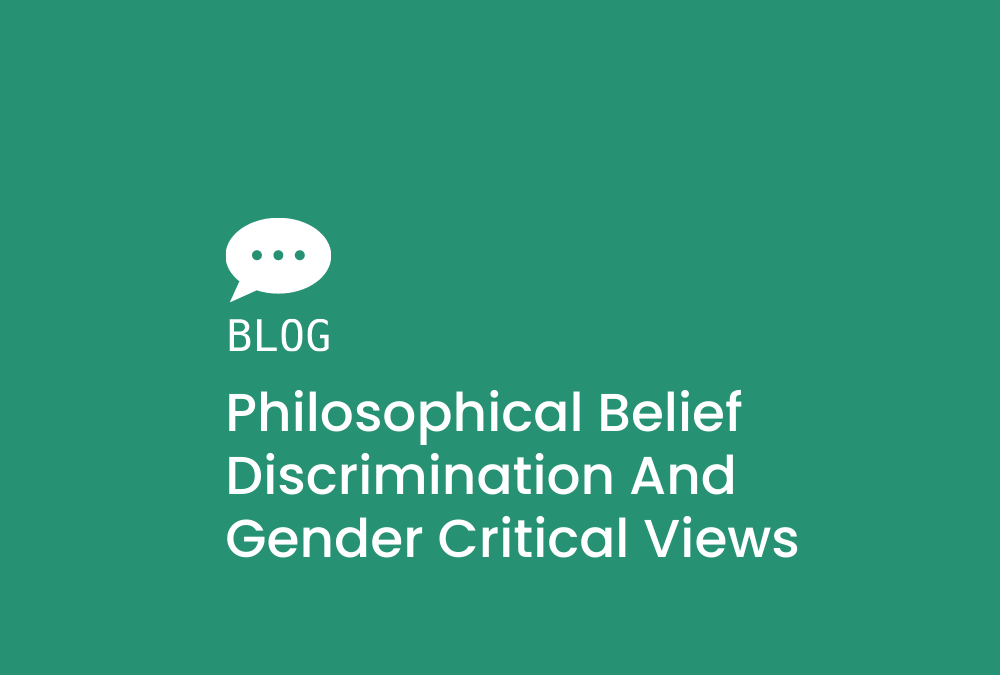Philosophical Belief Discrimination and Gender Critical Views
A woman who lost her job after saying that people cannot change their biological sex, has won her case at the Employment Appeal Tribunal.
The employer, CGD Europe (CGD), refused to renew Maya Forstater’s employment contract after she had posted tweets on gender recognition. Mrs Forstater had become engaged in the debate concerning proposed reforms to the Gender Recognition Act, which would allow trans people to self-identify and legally transition from the gender assigned to them at birth without a medical diagnosis. After complaints were raised claiming some of her tweets were ‘transphobic’, CGD did not renew her contract and Mrs Forstater lodged a discrimination claim in the Employment Tribunal stating her protected characteristic was her beliefs.
The question for the Court was ‘is believing that there are just two biological sexes in human beings, and that it is impossible for a human being to literally change their sex’, a ‘philosophical belief’ for the purposes of section 10 of the Equality Act 2010 (Equality Act). If it was, this would mean a person would not be allowed to be discriminated against for holding this view.
In the initial hearing at the Employment Tribunal, Judge James Tayler said that Mrs Forstater’s approach was “not worthy of respect in a democratic society” and that she was not entitled to ignore the rights of a transgender person and the “enormous pain that can be caused by misgendering”.
But Mrs Forstater appealed this decision and the Honourable Mr Justice Choudhury, sitting in the Employment Appeal Tribunal had to decide whether the belief ‘Is worthy of respect in a democratic society, not incompatible with human dignity and doesn’t conflict with the fundamental rights of others’. Justice Choudhury said that Mrs Forstater’s “gender-critical beliefs” did amount to a ‘philosophical belief’ and afford her protection under the Equality Act. Justice Choudhury held her views “did not seek to destroy the right of trans persons” and that the Employment Tribunal was wrong to assume her belief meant she would always ‘misgender’ a trans persons. Explaining that the original Tribunal had “erred in law”, adding that while her views “may well be profoundly offensive and even distressing” … “they must be tolerated in a pluralist society”. Mr Justice Choudhury also cautioned that “This judgment does not mean that those with gender-critical beliefs can ‘mis-gender’ trans persons with impunity” and that “The claimant, like everyone else, will continue to be subject to the prohibitions on discrimination and harassment that apply to everyone else”.
In a statement following the ruling, Mrs Forstater said “I am delighted to have been vindicated. I lost my job simply for expressing a view that is true and important, and held by the great majority of people in this country: sex matters. Being a woman is a material reality. It is not a costume or a feeling. Institutions that pretend sex doesn’t matter become hostile places for women, in particular”.
Amanda Glassman, Executive Vice President of CGD, said “The decision is disappointing and surprising because we believe Judge Taylor got it right when he found this type of offensive speech causes harm to trans people, and therefore could not be protected under the Equality Act. Today’s decision is a step backwards for inclusivity and equality for all. We’re currently considering the various paths forward with our lawyers”.
The differing views of the employer and employee in this case goes to demonstrate the sensitivity of this debate and shows it still looms large in Britain’s political debate too. While Sir Keir Starmer has reaffirmed Labour’s commitment to reforming the Gender Recognition Act and introducing self-identification for trans people, Boris Johnson’s Conservatives do not intend to introduce any such changes. The Government’s view is that the balance struck in the current Legislation is correct, in that there are proper checks and balances in the system but also support for people who want to change their legal sex.
This is very unlikely to be the end of the debate and it is also unlikely that this will be the last legal challenge we see before the Courts on the issue. However, whatever side of the argument people may come down on and whatever this area of the law may look like in the future, the Courts, for now at least, have had their say.
This landmark decision means that women and men who hold gender critical views will have a potential remedy under the Equality Act if they are discriminated against, harassed or victimised on account of their beliefs by employers, service providers or membership organisations.
Disclaimer
The topics covered in this update are complex and are provided for general guidance only. Therefore, if any of the circumstances mentioned in this update have application to individual situations you will need to take specific legal advice.
The information in this update is correct as of 14 June 2021 and should be read alongside the government’s specific guidance.
We hope you have found this update useful and if you do have any queries please get in touch.
Marie Walsh – Director, Employment Solicitor and Mediator
Direct Dial 0113 8874670
Mobile 07736252681
Reception: 0113 3229222
Address: 4 Park Place, Leeds LS1 2RU
Victoria Horner – Senior Associate
Direct Dial: 01138874673
Andy Boyde – Senior Associate
Direct Dial: 0113 323 0346 Mobile: 07516 030 531
Laura Huntington – Senior Paralegal
Mobile: 07541690175

